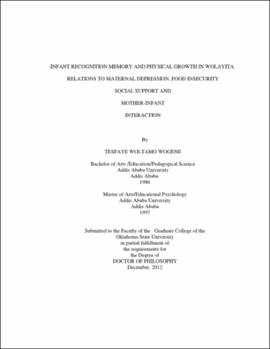| dc.contributor.advisor | Hubbs-Tait, Laura | |
| dc.contributor.author | Wogene, Tesfaye Woltamo | |
| dc.date.accessioned | 2013-11-26T08:27:48Z | |
| dc.date.available | 2013-11-26T08:27:48Z | |
| dc.date.issued | 2012-12 | |
| dc.identifier.uri | https://hdl.handle.net/11244/6989 | |
| dc.description.abstract | Scope and Method of Study: The purpose of the study was to assess relations of maternal depression (Edinburgh Postnatal Depression Scale, EPDS), food insecurity, social support, maternal nutrition status (BMI), maternal education, family economic resources, and perceived social status with mother-infant interaction and infant weight-for-age (WAZ), length-for-age (LAZ), weight-for-length (WLZ), and recognition memory. In phase I, mother-infant dyads (N=201) were recruited by convenience sampling in Wolayita, Southern Ethiopia. Maternal depression, stressful life events, food insecurity, social support, demographic variables, and maternal weight and height and infant weight and length were measured. In phase II, 83 mother-infant dyads were recruited from the phase I sample; attrition reduced the sample to 73 (n=34 with EPDS >=12 and n=39 with EPDS > 14). Mother-infant interaction was videotaped and infant cognitive skills, look duration (information processing speed) and recognition memory (novelty preference) were measured. | |
| dc.description.abstract | Findings and Conclusions: Main findings were (1) Continuous EPDS scores measuring maternal depression were not directly associated with infant growth. Food insecurity, beta= -.215, p <.01, maternal low BMI, beta=-.137, p <.05, and infant age, beta=-.203, p<.01, predicted WLZ. Maternal education predicted WAZ, beta=.176, p<.05, and LAZ beta=.131, p< .08. (2) Relation of maternal depression to infant growth was moderated by maternal BMI and social support. For infants of mothers with BMI > 18.5 or more social support, EPDS was not related to weight or length. For infants of mothers with BMI < 18.5, EPDS was significantly negatively related to WAZ and LAZ; for infants of mothers with low social support, EPDS was significantly negatively related to WAZ and WLZ. (3) EPDS scores categorized from low to high depressive symptoms were significantly negatively related to maternal positive affect in interactions. (4) Lower maternal depression and higher maternal positive affect were associated with faster infant information processing but infant underweight status was associated with poorer recognition memory. Results are interpreted as reconciling previous inconsistent findings. | |
| dc.format | application/pdf | |
| dc.language | en_US | |
| dc.rights | Copyright is held by the author who has granted the Oklahoma State University Library the non-exclusive right to share this material in its institutional repository. Contact Digital Library Services at lib-dls@okstate.edu or 405-744-9161 for the permission policy on the use, reproduction or distribution of this material. | |
| dc.title | Infant recognition memory and physical growth in Wolayita: Relations to maternal depression, food insecurity, social support, and mother-infant interaction | |
| dc.contributor.committeeMember | Larzelere, Robert E. | |
| dc.contributor.committeeMember | Thomas, David G. | |
| dc.contributor.committeeMember | Stoecker, Barbara J. | |
| osu.filename | Wogene_okstate_0664D_12401 | |
| osu.accesstype | Open Access | |
| dc.type.genre | Dissertation | |
| dc.type.material | Text | |
| dc.subject.keywords | infant growth | |
| dc.subject.keywords | maternal BMI | |
| dc.subject.keywords | maternal depression | |
| dc.subject.keywords | mother-infant interaction | |
| dc.subject.keywords | visual information processing | |
| thesis.degree.discipline | Human Sciences | |
| thesis.degree.grantor | Oklahoma State University | |
